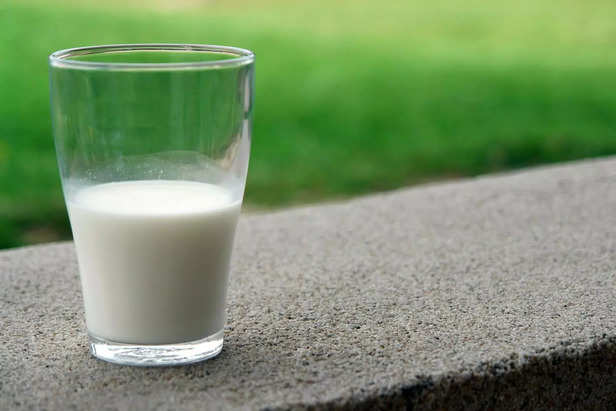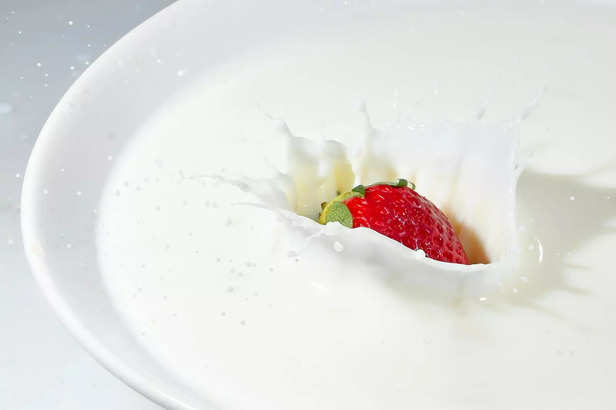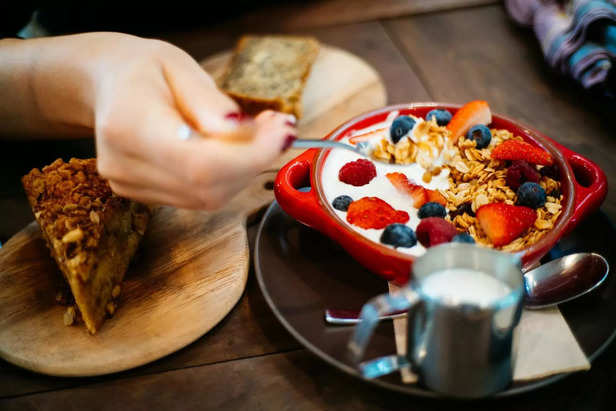Quit Milk for 30 Days—Here’s What Happens to Your Body
Riya Kumari | Apr 03, 2025, 13:33 IST
So, I did it. I quit milk for 30 days. And let me tell you, it was not the milk carton breakup I imagined. No dramatic “It’s not me, it’s you” speech to the fridge, no solemn piano music playing as I walked away from my cappuccino. Just me, realizing that maybe—just maybe—milk and I were in a toxic relationship. You see, milk and I have history. Childhood nostalgia? Check. Emotional dependency? Check. A long-standing pattern of betrayal in the form of bloating, breakouts, and general digestive drama? Double check. So, I ditched it. Cold turkey. Or, well, cold almond.
I quit milk for 30 days. Not as some grand statement, not as part of a fad, not even because of a documentary that made me question my entire diet while I ate a cheese sandwich. I quit milk because I started wondering about the things I consume—and the things that, in turn, consume me. Because, let’s be honest, most of us don’t question the things we’ve always done. We drink milk because we grew up drinking milk. We eat certain foods, believe certain things, live certain ways—not necessarily because they’re good for us, but because we never stopped to ask if they were. So, I decided to ask. And here’s what I learned.
Week 1: The Absence of Something is Often the Loudest Sound

The first thing you notice when you quit something is not its absence—it’s its presence in everything you do. It’s in your coffee, your comfort foods, your daily rituals. It’s muscle memory. I reached for milk without thinking, like a reflex, like a habit passed down through generations, unquestioned and unchallenged.
But then, something strange happened. Without milk, my body changed in ways I didn’t expect. That subtle bloating I had chalked up to just how digestion works? Gone. The occasional nausea I thought was normal? Also gone. My body was telling me something it had been trying to say for years, but I had been too distracted to listen. It made me wonder—how much of what we feel, how much of what we struggle with, is just us accepting discomfort as normal? How many things have we learned to live with simply because we never imagined life without them?
Week 2: What If You’ve Been Tolerating Something That Was Never Meant for You?

Two weeks in, I had a strange thought: Was milk ever really meant for me? We grow up believing in its necessity. That it makes us strong, that it’s the best source of nutrition, that life without it is incomplete. But here I was—without it—and I wasn’t just fine; I was better. My digestion was smoother, my skin was clearer, my energy was steadier.
It made me wonder—how often do we keep things in our lives, not because they serve us, but because we’ve been told they should? How many things do we hold onto—relationships, beliefs, habits—simply because we’re afraid to consider another way? We mistake tolerance for necessity. Just because we can digest something doesn’t mean we should. Just because we can endure something doesn’t mean it belongs in our lives.
Week 3: The Weight of Other People’s Opinions

By now, my body had adjusted. My mind, however, had to deal with something else entirely—other people. It turns out, telling people you quit milk invites an exhausting amount of debate. “But where will you get your calcium?” (Spoiler: Many places. Ever heard of leafy greens?) “Milk is natural!” (So is quicksand, but you don’t see me diving in.) “Are you one of those people now?” (If ‘those people’ means questioning things instead of blindly following, then sure.)
It made me realize—people are deeply uncomfortable when you challenge something they’ve never questioned. Not because they care about your milk intake, but because your choice forces them to confront their own. We think we make our own decisions, but so often, our choices are dictated by the fear of what others might say. We drink milk, not necessarily because we want to, but because everyone else does. We shape our lives around the comfort of conformity, rarely stopping to ask whether the things we believe, the things we do, are actually ours to begin with.
Week 4: Some Things Nourish. Some Things Deplete. Learn the Difference.

By the last week, the cravings were gone. I no longer felt like I was missing something. I felt… lighter, clearer, in control. Milk had been a part of my life for so long that I never thought to question its role. But here’s the truth: Not everything that has been with you for a long time deserves to stay. Your body speaks. It tells you, in symptoms, in discomfort, in fatigue, what it needs and what it doesn’t. The problem is, we’ve learned to ignore it. We drown it out with routine, with expectations, with the noise of everything we’ve been told is ‘normal.’
But the real question is: Do you want to live by default, or by design? Because this isn’t just about milk. It’s about everything. The things you eat, the people you surround yourself with, the habits you cling to—some nourish, some deplete. Learn the difference. And when you do, don’t be afraid to let go of what no longer serves you. After 30 days, I didn’t just quit milk. I quit assumptions. I quit automatic choices. I quit the idea that just because something has always been a part of my life, it should always be.
Week 1: The Absence of Something is Often the Loudest Sound

Question
( Image credit : Pexels )
The first thing you notice when you quit something is not its absence—it’s its presence in everything you do. It’s in your coffee, your comfort foods, your daily rituals. It’s muscle memory. I reached for milk without thinking, like a reflex, like a habit passed down through generations, unquestioned and unchallenged.
But then, something strange happened. Without milk, my body changed in ways I didn’t expect. That subtle bloating I had chalked up to just how digestion works? Gone. The occasional nausea I thought was normal? Also gone. My body was telling me something it had been trying to say for years, but I had been too distracted to listen. It made me wonder—how much of what we feel, how much of what we struggle with, is just us accepting discomfort as normal? How many things have we learned to live with simply because we never imagined life without them?
Week 2: What If You’ve Been Tolerating Something That Was Never Meant for You?

Milk
( Image credit : Pexels )
Two weeks in, I had a strange thought: Was milk ever really meant for me? We grow up believing in its necessity. That it makes us strong, that it’s the best source of nutrition, that life without it is incomplete. But here I was—without it—and I wasn’t just fine; I was better. My digestion was smoother, my skin was clearer, my energy was steadier.
It made me wonder—how often do we keep things in our lives, not because they serve us, but because we’ve been told they should? How many things do we hold onto—relationships, beliefs, habits—simply because we’re afraid to consider another way? We mistake tolerance for necessity. Just because we can digest something doesn’t mean we should. Just because we can endure something doesn’t mean it belongs in our lives.
Week 3: The Weight of Other People’s Opinions

Milk products
( Image credit : Pexels )
By now, my body had adjusted. My mind, however, had to deal with something else entirely—other people. It turns out, telling people you quit milk invites an exhausting amount of debate. “But where will you get your calcium?” (Spoiler: Many places. Ever heard of leafy greens?) “Milk is natural!” (So is quicksand, but you don’t see me diving in.) “Are you one of those people now?” (If ‘those people’ means questioning things instead of blindly following, then sure.)
It made me realize—people are deeply uncomfortable when you challenge something they’ve never questioned. Not because they care about your milk intake, but because your choice forces them to confront their own. We think we make our own decisions, but so often, our choices are dictated by the fear of what others might say. We drink milk, not necessarily because we want to, but because everyone else does. We shape our lives around the comfort of conformity, rarely stopping to ask whether the things we believe, the things we do, are actually ours to begin with.
Week 4: Some Things Nourish. Some Things Deplete. Learn the Difference.

Breakfast
( Image credit : Pexels )
By the last week, the cravings were gone. I no longer felt like I was missing something. I felt… lighter, clearer, in control. Milk had been a part of my life for so long that I never thought to question its role. But here’s the truth: Not everything that has been with you for a long time deserves to stay. Your body speaks. It tells you, in symptoms, in discomfort, in fatigue, what it needs and what it doesn’t. The problem is, we’ve learned to ignore it. We drown it out with routine, with expectations, with the noise of everything we’ve been told is ‘normal.’
But the real question is: Do you want to live by default, or by design? Because this isn’t just about milk. It’s about everything. The things you eat, the people you surround yourself with, the habits you cling to—some nourish, some deplete. Learn the difference. And when you do, don’t be afraid to let go of what no longer serves you. After 30 days, I didn’t just quit milk. I quit assumptions. I quit automatic choices. I quit the idea that just because something has always been a part of my life, it should always be.
